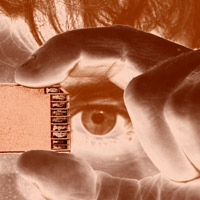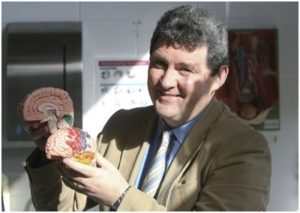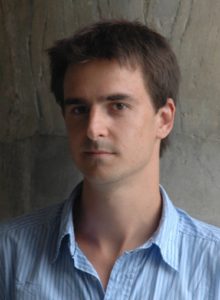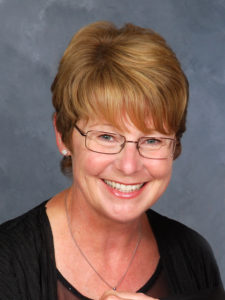 ‘The Chemistry of Life’ is the theme of this year’s Science Week, which runs from Sunday November 13th to 20th.
‘The Chemistry of Life’ is the theme of this year’s Science Week, which runs from Sunday November 13th to 20th.
Through a series of nationwide events, Science Week will bring to life chemistry’s vital role in society. From the toothpaste we use to clean our teeth to the mobile phone in our pockets – chemistry is all around us! Science Week will also demonstrate the importance of chemistry to the future development of the Irish economy.
Science Week kicks off at IT Sligo with the Science Fair on Sunday, November 13th. Read more about the Science Fair here .
There will also be a nightly, free lectures during Science Week at IT Sligo, from Monday to Friday, November 14th to 18th with subject matters ranging from extraterrestrial life to the causes of Alzheimer’s disease.
Time Team star discusses DNA at Fromelles
In 2009 eight unmarked mass graves were discovered near the village of Fromelles in northern France. Since the discovery, the remains of 250 soldiers who died during World War 1, in the Battle of Fromelles have been exhumed.
In a Science Week lecture “The Lost Soldiers of Fromelles”, at IT Sligo on Tuesday, November 15th, Professor Margaret Cox will detail how with the help of DNA analysis, 110 bodies have been identified, thus laying to rest ghosts which have shadowed many families for generations.
Professor Cox is Scientific Advisor to the UK and Australian Governments for the Fromelles Project which will continue until 2014. She is also star of the Channel 4 programme, Time Team. The Battle of Fromelles occurred on the 19th July 1916.The action was intended partly as a diversion from the Battle of the Somme, which was taking place about 80 kilometers to the south. After a night and a day of fighting it is believed that 1500 British and 5,533 Australian soldiers were killed, wounded or taken prisoner.
“Some bodies were recovered but those who died on or over German lines were buried by the Germans and reported as missing in action to their families,” explained Professor Cox who believes that 2,000 bodies were never recovered. The Fromelles Project used a process of archaeological, anthropological and historic research, combined with DNA analysis, to identify the remains of 110 soldiers so far.
Prof Cox designed the identification process and chaired its implementation. “We had to track down the families of missing soldiers and persuade them to donate DNA,” she explained.
Poignantly many personal effects were found in tact with the remains. “We found a return train ticket tucked inside a gas mask”, said Prof Cox who explained that one young Australian soldier was apparently sustained by the belief that he would be going home.
The team also found little leather hearts containing mementos such as a lock of hair or a gold cross, as well as personal diaries and letters.
In what promises to be a fascinating lecture, Professor Cox will also confirm to her Sligo audience that speculation that a young Adolf Hitler fought at Fromelles, is true. “I actually have a photograph of him at Fromelles with his dog”, she revealed.
More about Professor Margaret Cox
Margaret Cox, who recently retired from her post as Professor of Forensic Archaeology and Anthropology at Cranfield University, is probably best known for her work as forensic anthropologist or human bone specialist for Channel 4’s Time Team. She has also appeared in the BBC’s Meet the Ancestors and numerous TV documentaries and radio programmes. With over 100 publications to her name she is an internationally acclaimed specialist in her field.y
Prof Cox regularly undertakes work for the Ministry of Defence and the Commonwealth War Graves Commission
She has worked on several UK criminal investigations recovering human remains from clandestine graves. This ultimately led to her involvement in the excavation of mass graves in Kosovo in 1999 and subsequent work in the investigation of serious international crime in such places as Rwanda, Iraq and Cyprus. Ten years ago Margaret established a charity ‘Inforce’ an international forensic centre of excellence for the investigation of genocide, war crimes and crimes against humanity
 Inside the Brain – Alzheimer’s Disease
Inside the Brain – Alzheimer’s Disease
The incidence of Alzheimer’s Disease worldwide is expected to quadruple by 2020, according to Professor Billy O’Connor’s from the University of Limerick whose lecture “Inside the Brain –Alzheimer’s disease” on Monday, November 14th will probe how the brain works and explain how factors like diet and physical and mental exercise can help prevent the disease.
Professor O’Connor of University of Limerick, will give one of the free nightly lectures during Science Week at IT Sligo.
There are currently 35,000 cases of dementia in Ireland, half of them in the Alzheimer’s category and according to Professor O’Connor, the apparent surge in numbers in recent years is related to our increasing life span.
While Alzheimer’s becomes more prevalent as people reach their seventies and eighties, Professor O’Connor will stress that it is not inevitable and not part of the natural aging process. He will explore why “ some people age gracefully, showing only minor – and at worst exasperating – cognitive changes” , while others experience a more severe and disabling memory decline such as that seen in Alzheimer’s disease.
Professor O’Connor will detail how current treatments can “offer temporary mitigation” but he will also stress the key role mental exercise can play in protecting people. “The big drive now is to delay the onset and that is where diet and physical and mental exercise comes in,” he stressed. “When I worked in Beaumont Hospital we had a saying about the brain – ‘use it or lose it’”.
Those attending the lecture will hear how being optimistic and also how doing crossword puzzles can help. And how head injuries or epilepsy can make the brain more susceptible. “That is why boxers are now scanned every few years and why it is so important to wear helmets while hurling” he said.
Professor O’Connor will detail how research has thrown up some surprising tools in the fight against Alzheimer’s. Anti-oxidants found in some common cooking spices, the popular anti-cholesterol drug Lipitor and the well-known anti-inflammatory drug ibuprofen and green tea have all achieved promising results.
His blog ‘Inside the brain’ which was a finalist in this year’s Irish Blog Awards, reports on the latest from the world of brain research including recent neuroscience findings to get the best from your brain.
More about Professor Billy O’Connor
Professor William T. (Billy) O’Connor is an internationally recognised leader in both research and education in neuroscience. Billy has held appointments at several medical schools including Head of Neuroscience Research in University College Dublin, Ireland and Associate Professor of Pharmacology at the Karolinska Institute, Stockholm, Sweden. He is currently Foundation Chair in Physiology at the Graduate Entry Medical School, University of Limerick, Ireland.
 Astrobiology: The hunt for Alien Life
Astrobiology: The hunt for Alien Life
In his lecture on Thursday, November 17th, “Astrobiology: The Hunt for Alien Life, ” Dr Lewis Dartnell will probe one of the most intriguing questions of them all – “is there anyone else out there?”
A researcher based at the University of London, Dr Dartnell will define exactly what “life” is and examine how it emerged in our world.
‘Astrobiology’ is a brand new field of science, encompassing research into the origins and limits of life on our own planet, and where life might exist beyond the Earth .
“In my lecture at IT Sligo I am going to focus mostly on Mars which is out next door neighbour,” Dr Dartnell explained. He will explain to his audience why scientists have always believed that the warm and wet conditions on Mars may have made it feasible for some sort of life form to exist there.
But Dr Dartnell will also explain why any life to be found in our solar system is likely to be primitive, like bacteria.
Those who dream of one day encountering ET will be heartened to know that Dr Dartnell is not ruling out the possibility that a more intelligent life form may have evolved in another environment within the galaxy. “In the next two to three years we hope to discover other earth-like planets where conditions may be right for the evolution of intelligent life,” he said.
Dr Dartnell’s talk which should appeal to anyone from the age of 12 up, will look at the most extreme conditions terrestrial life can tolerate. He will invite his audience to ponder whether the cuddly aliens Hollywood has dreamed up, bear any similarity to any other being out there. And he will take listeners on a tour of the other planets and moons in our solar system and to distant orbiting stars, to see if any of these environments could realistically harbour life.
More about Dr Lewis Dartnell
Dr. Lewis Dartnell (lewisdartnell.com) is a researcher based at University College London, studying how life, and signs of its existence, might survive the intense cosmic radiation on the surface of Mars. Alongside his research he writes regular science articles in newspapers and magazines, and has published a popular science book introducing astrobiology, ³Life in the Universe: A Beginner¹s Guide².
There will be nightly, free lectures at IT Sligo during Science Week. All are free and open to all members of the public to attend. See the full schedule of lectures below.
Image Captions:
First Image of Professor Margaret Cox.
Second Image of Professor Billy O’Connor.
Third Image of Dr Lewis Dartnell.
|
Sunday, November 13 | Monday, November 14 | Tuesday. November 15 | Wednesday, November 16 | Thursday, November 17 | Friday, November 18 | |
| TOPIC | Science Fair | Inside the brain – Alzheimer’s Disease | The Lost Soldiers of Fromelles | Drugs in Sport | Astrobiology – The hunt for Alien Life | The Re-introduction of Irish Birds of Prey | |
| SPEAKER | Full, Family Day of Science & Technology Activities | Dr. William O’Connor; University of Limerick | Margaret Cox, Forensic Anthropologist | Cathy McHugh | Dr. Lewis Dartnell, The Centre For Planetary Sciences at UCL/Birkbeck, University College London | Lorcan O’Toole, The Golden Eagle Trust | |
| WHERE | IT Sligo, Main Building | IT Sligo, A0006 | IT Sligo, A0006 | IT Sligo, A0006 | IT Sligo, A0006 | IT Sligo, A0006 | |
| TIME | 12noon to 6pm | 8pm | 8pm | 8pm | 8pm | 8pm |
